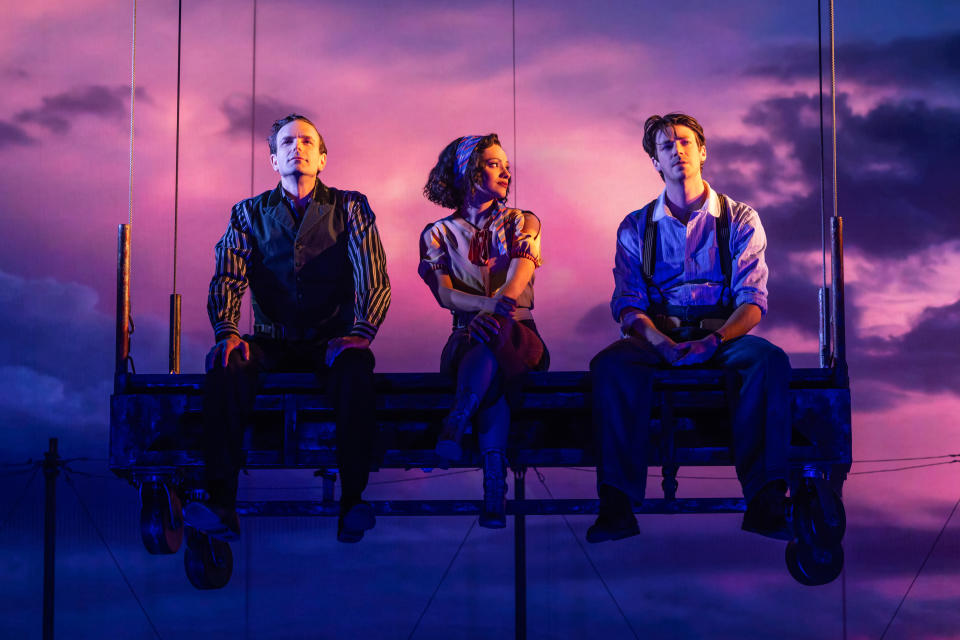How Do You Turn ‘Water for Elephants’ Into a Broadway Musical?

It all began with some brie cheese.
When director Jessica Stone first envisioned how to bring “Water for Elephants,” the beloved book that became the 2011 Reese Witherspoon/Robert Pattinson film, to Broadway there were plenty of questions about how it all would work. She knew she wanted it to be a memory play, with Jacob (charming “The Flash” star Grant Gustin when young, an endearing Gregg Edelman when older) looking back over his time in the circus.
More from IndieWire
The 12 Best Thrillers Streaming on Netflix in April, from 'Fair Play' to 'Emily the Criminal'
Olivia Colman and Benedict Cumberbatch to Lead 'War of the Roses' Remake
“My most vibrant memory is eating baked brie with Shana [Carroll],” Stone said to IndieWire, referring to the co-choreographer and circus designer. “I had shown her this picture of an aerialist; it wasn’t exactly a hoop but it was shaped like a horseshoe. This image was just really compelling to me.”
In an early rehearsal, they put a company member up in a hoop to see what happened. “Watching her go from feeling and pain to flying and feeling no pain [was clarifying],” she said. “And she improvised and we all started crying.”
For those who missed the Witherspoon/Pattinson romantic drama, “Water for Elephants” follows a circus man looking back on his younger days: Falling on hard times during the Great Depression, former veterinarian Jacob gets in with a traveling circus. There’s a mean owner, Charlie, a rough love triangle, and plenty of stunning animals — including the titular Rosie, an elephant Jacob must learn to communicate with in order to save his circus friends, not to mention the potential love of his life.
The hoop scene described above was the early stages of what would become one of the most memorable moments in the new Broadway musical, the haunting musical number “Easy” that finds an injured horse — made up of both mask/props as well as a separate aerialist — spiritually free from his body as he rises above overhead. It’s beautiful and moving.
The result is a circus unlike any you’ve seen before. “I always knew I didn’t want to do a show where people just kind of arbitrarily peeled off in back handsprings,” Stone, who most recently directed Tony-winner “Kimberly Akimbo,” said with a laugh. “It’s not what happens in the circus. So I wanted to think about how I wanted to use that vocabulary. And that I wanted to use it to illuminate some of our protagonists most important moments [and] memories.”

A “different kind of circus” is apparent with the animals. The show is a NY Times Critics Pick, and a big part of that distinction must be the creative way the show deploys the circus critters: Instead of real animals, it leans on the power of suggestion, so the aforementioned horse is merely a head free from a body; an elephant, just two giant ears. “It wasn’t really about doing literal representation of every single animal,” Stone said. “It was like a brushstroke.” As Jacob begins to understand Rosie better, more and more of her “comes to life” and is shown to the audience. Memories! They sure are complicated!
The show follows in broad ways both the book and film, and there is no shortage of those adaptions this Broadway season. The appeal in this story for Stone was finding a different way forward. “If you’re adapting a story for the stage, it has to be through a new lens,” she said. “Sarah [Gruen’s] book, there’s tremendous detail in it. I understand why it was turned into a movie. But the thing to me that sings is the idea of a guy who thinks — both in his early part of his life and in [the] later part of his life — he’s lost everything. He thinks it’s over, and he makes a choice to continue. That to me, sings, and that is something that can fill up a large theater on Broadway as opposed to a movie theater.
She continued, “So while I think adaptations of books and movies are completely great source material for a play or a musical, I think it’s important to ask why? Something that is unedited and in real time: Why that story? What makes it tick in that form? So much about theater is language: What is the language that’s going to fill the space? I think that all source material is fair game for theatre. It’s just a matter of really asking oneself: Does it sing?”
Quite literally: oh yes.
“Water for Elephants” is now playing on Broadway.
Best of IndieWire
The 12 Best Thrillers Streaming on Netflix in April, from 'Fair Play' to 'Emily the Criminal'
Quentin Tarantino's Favorite Movies: 61 Films the Director Wants You to See
Sign up for Indiewire's Newsletter. For the latest news, follow us on Facebook, Twitter, and Instagram.


